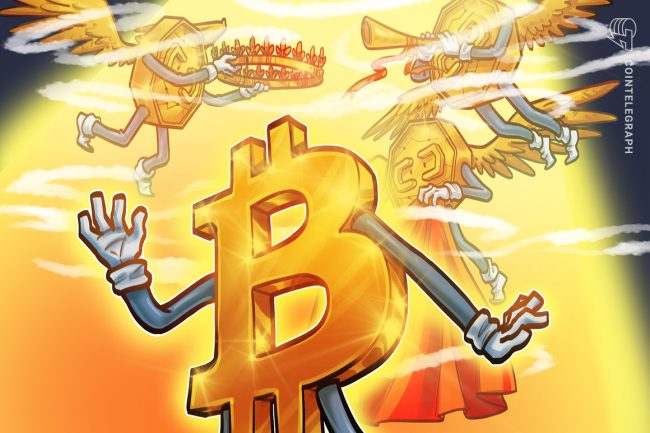Happy white paper day, Bitcoin. It’s been 14 years since Satoshi Nakamoto first sent an email to the Cypherpunk mailing list with the subject line, “Bitcoin P2P e-cash Paper.” The email included a link to the white paper, an outline of what would soon become a one trillion-dollar market.
The first sentence of the email has become iconic among the Bitcoin community:
“I’ve been working on a new electronic cash system that’s fully peer-to-peer, with no trusted third party.”
Over the past 14 years, Bitcoin (BTC) has morphed from a hobbyist pastime into a globally recognized brand. Bitcoin has been adopted as legal tender in regions of the global south such as El Salvador and the Central African Republic. It is used by freedom fighters and campaigners while being a tool for financial emancipation and economic empowerment worldwide.
The speculative fervor that Bitcoin became known for still lingers while Bitcoin’s reputation as being a tool for illicit activities clings on, despite the fact that the United State dollar remains a far more effective tool for hiding financial activity.
In 2022, Bitcoin has evolved into so much more. Cointelegraph spoke to Bitcoin OGs, enthusiasts and newbies during the Plan B Conference in Lugano, Switzerland, to investigate what the white paper means to the world.
Doing its ₿it for good
For world-renowned charities such as Save the Children, the white paper and the subsequent creation of Bitcoin have benefited the organization. Antonia Roupell, Web3 lead at Save the Children, told Cointelegraph that the organization recognizes “Bitcoin’s potential to be a force for good and a force for financial inclusion,” adding:
“On Bitcoin’s 14th anniversary, and at a time of increasingly global financial inequality, the phrase ‘bitcoin is for anyone’ really resonates.”
Roupell explained that Save the Children US was the first iNGO to accept Bitcoin in 2013, stating, “Since then, we’ve raised almost 75 BTC thanks to generous donations to our relief efforts supporting children impacted by conflict in places like Afghanistan and Ukraine as well as families impacted by climate disasters such as Hurricane Ian in Florida.”
Crisis zones have underscored the resiliency and effectiveness of Bitcoin. In the first 48 hours of the Ukraine war, for example, the Ukraine government received $7.5 million in Bitcoin.
Stand with the people of Ukraine
Now accepting cryptocurrency donations. Ethereum. Bitcoin and Tether (USDTtrc20)BTC — 357a3So9CbsNfBBgFYACGvxxS6tMaDoa1P
ETH — 0x165CD37b4C644C2921454429E7F9358d18A45e14
USDT (trc20) — TEFccmfQ38cZS1DTZVhsxKVDckA8Y6VfCy
— Mykhailo Fedorov (@FedorovMykhailo) February 26, 2022
The speed at which Bitcoin hit government wallet addresses inspired the United Nations International Computing Centre (UNICC) to take crypto donations seriously, UNICC Director Sameer Chauhan explained in a Cointelegraph interview at the World Economic Forum in Davos. USD, British pounds, euros and government-issued money were much slower to trickle in to support the Ukrainian defense than Bitcoin.
Decentralization and empowerment
For Bitcoin Gandalf, a marketer for Braiins — a Bitcoin mining tools company — the white paper and the subsequent pseudonymous network guarantee a basic level of privacy. Gandalf, who chose to obfuscate his name and face on the internet, told Cointelegraph:
“With the increased surveillance propagated by the state and huge centralized tech companies that control the majority of information distribution, it’s more important than ever that we have decentralized alternatives that guarantee us basic freedoms.”
Bitcoin is a permissionless network that anyone can use. It does not discriminate. Even for those without an internet connection, thanks to innovations in mobile network technology, Bitcoin can be sent like a text. Bitcoin’s mantra of being a “freedom technology” has bloomed across its 14-year history.
During the Plan B conference in Lugano, Switzerland, “Freedom” was a central theme. Julian Assange’s family hosted talks about his incarceration for exposing military secrets, while speakers from Togo to Lebanon shed light on “Bitcoin the tool for financial freedom.” A drone show emblazoned the night sky with the cliché, bringing the Bitcoin and blockchain conference to a close:
#Bitcoin is Freedom pic.twitter.com/WjVvVsSBPB
— CARLA⚡️(thecryptoc0up1e) (@thecryptoc0up1e) October 29, 2022
Several announcements at the conference in Switzerland underscored the Bitcoin community’s commitment to freedom. Paolo Ardoino, chief technology officer of Tether, introduced Pear Credit, a peer-to-peer credit software that could undermine the proliferation of centralized authorities (or blockchains) that issue credit and tokens. Founded by Tether, Holepunch and Synonym, Pear Credit should “put control of the economy back in the hands of the people.”
In an exclusive interview with Cointelegraph, Ardoino…
cointelegraph.com
